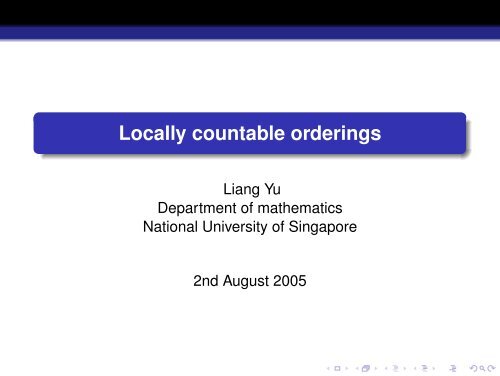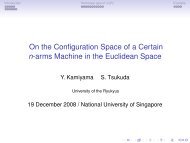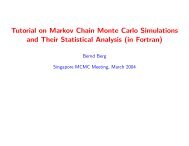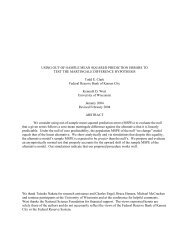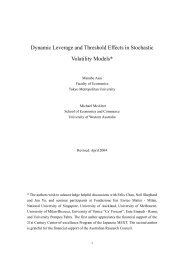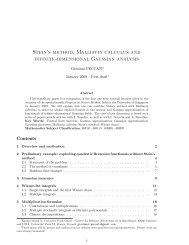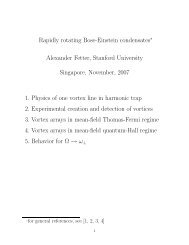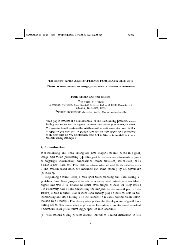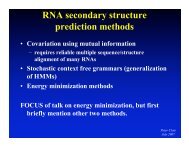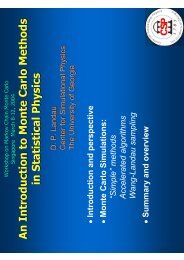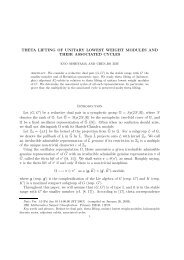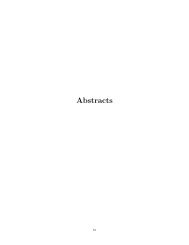Locally countable orderings
Locally countable orderings
Locally countable orderings
You also want an ePaper? Increase the reach of your titles
YUMPU automatically turns print PDFs into web optimized ePapers that Google loves.
<strong>Locally</strong> <strong>countable</strong> <strong>orderings</strong><br />
Liang Yu<br />
Department of mathematics<br />
National University of Singapore<br />
2nd August 2005
<strong>Locally</strong> <strong>countable</strong> <strong>orderings</strong><br />
Liang Yu<br />
Department of mathematics<br />
National University of Singapore<br />
2nd August 2005
The basic Refs are Downey and Hirschfeldt’s book, Lerman’s<br />
book, Moschovakis’ book and Sacks’ book.<br />
http://www.mcs.vuw.ac.nz/ ∼ downey/
Notations<br />
We say P = 〈P, ≤〉 is a partial order if ≤ is a self-reflexive<br />
transitive binary relation on P.<br />
Definition<br />
A partial order P = 〈P, ≤〉 is locally <strong>countable</strong> if for every p ∈ P,<br />
|{q ∈ P|q ≤ p}| ≤ ℵ 0 .<br />
An antichain in a partial order is a non-empty set in which any<br />
two different elements are incomparable.
Motivation<br />
Counting the antichains.<br />
Theorem (Sacks)<br />
Every maximal chain in the Turing degrees has size ℵ 1 and is of<br />
measure 0.<br />
Theorem (folklore)<br />
Every maximal antichain in the Turing degrees has size 2 ℵ 0<br />
Question<br />
How big can be a size of a chain and an antichain in the Turing<br />
degrees? Is there an antichain in the Turing degrees which is<br />
not of measure 0?
Main Question<br />
Question<br />
For any locally <strong>countable</strong> Σ 1 1 partial order P = 〈2ω , ≤ P 〉, does<br />
there exist a nonmeasurable antichain in P?
Higher recursion theory I<br />
x ≤ h y if x is ∆ 1 1 (z) definable. x ≤ h y is a Π 1 1 -relation.<br />
Theorem (Harrison )<br />
For any real z and <strong>countable</strong> Σ 1 1 (z) set Z ⊂ 2ω , if x ∈ Z , then<br />
x ≤ h z.<br />
Corollary<br />
If P = 〈2 ω , ≤ P 〉 is a Σ 1 1<br />
locally <strong>countable</strong> partial order, then for<br />
any x, y ∈ 2 ω , x ≤ P y implies x ≤ h y.
Chains<br />
Lemma (Sacks)<br />
If x is not ∆ 1 1 , then µ({y|x ≤ h y}) = 0.<br />
Hence we have the following proposition.<br />
Proposition<br />
For any locally <strong>countable</strong> Σ 1 1 partial order P = 〈2ω , ≤ P 〉, every<br />
chain in P has measure 0.
Proposition<br />
1 Assume ZFC + V = L, there is a locally <strong>countable</strong> ∆ 1 2<br />
partial order P = 〈2 ω , ≤ P 〉 for which there is a chain of<br />
measure 1.<br />
2 Assume ZFC + MA ℵ1 , for any locally <strong>countable</strong> partial<br />
order P = 〈2 ω , ≤ P 〉, every chain has measure 0.
Randomness theory I<br />
Definition (Martin-Löf)<br />
(i) Given a real x, a Σ 0 n(x) Martin-Löf test is a computable<br />
collection {V n : n ∈ N} of Σ 0 n(x) sets such that<br />
µ(V n ) ≤ 2 −n .<br />
(ii) Given a real x, a real y is said to pass the Σ 0 n(x) Martin-Löf<br />
test if y /∈ ⋂ n∈ω V n.<br />
(iii) Given a real x, a real y is said to be n-x-random if it<br />
passes all Σ 0 n(x) Martin-Löf tests.
Definition<br />
Given a string σ ∈ 2
Randomness theory II<br />
Theorem (Miller and Yu)<br />
For every z ∈ 2 ω , every 1-random real Turing reducible to a<br />
1-z-random real is also 1-z-random.<br />
Theorem (van Lambalgen )<br />
For any number n > 0 and real x = x 0 ⊕ x 1 (or x = x 1 ⊕ x 0 ), x is<br />
n-random if and only if x 0 is n-random and x 1 is n-x 0 -random.<br />
So if x = x 0 ⊕ x 1 is n-random, then x 0 < T x.<br />
Theorem (Kurtz and Kautz)<br />
For every 2-random real x, there is a 1-generic real y so that<br />
y < T x.
0-law<br />
Proposition<br />
If X ⊆ 2 ω and µ(X) > 0, then there are two reals x, y ∈ X so<br />
that x < T y.<br />
Proof.<br />
We use Jockusch’ proof.<br />
µ(X ∩ [σ]) > 2 −|σ|−1 .<br />
Y = {x ∈ [σ]|x = x 0 ⊕ x 1 & x 0 ∈ X ∩ [σ]}.<br />
So we have the following proposition.<br />
Corollary<br />
If X is an antichain in the Turing degrees (or h-degrees) and<br />
measurable, then µ(X) = 0.
Higher randomness theory<br />
Definition<br />
Given a real z and a number n ≥ 1,<br />
1 A real x ∈ 2 ω is Π 1 n(z)-random if x ∉ A for each Π 1 n(z) set A<br />
for which µ(A) = 0.<br />
2 A real x ∈ 2 ω is Σ 1 n(z)-random if x ∉ A for each Σ 1 n(z) set A<br />
for which µ(A) = 0.<br />
3 A real x ∈ 2 ω is ∆ 1 n(z)-random if x ∉ A for each ∆ 1 n(z) set<br />
A for which µ(A) = 0.
Calculating the complexity I<br />
Proposition (Sacks)<br />
The predicate, µ(A) > r, is Π 1 1 , where A ranges over Π1 1 sets<br />
and r ranges over rationals.<br />
A set C is d − Σ 1 1 if it is a difference of two Σ1 1 sets.<br />
Corollary<br />
The predicate, µ(A ∩ B) > r, is ∆ 1 2 , where A ranges over Π1 1<br />
sets, B ranges over Σ 1 1<br />
and r ranges over rationals. In other<br />
words, the predicate, µ(C) > r, is ∆ 1 2<br />
, where C ranges over<br />
d − Σ 1 1<br />
sets, r ranges over rationals.
Calculating the complexity II<br />
Given two predicates P(z, i), Q(z, i) for which<br />
∀z∀i¬(P(z, i) & Q(z, i)) and a real x (or a string σ ∈ 2
Attacking the question I<br />
Lemma<br />
For any reals x ≤ h z, there is a Π 1 1<br />
predicate P(z, i) and<br />
d − Σ 1 1-predicate Q(z, i) so that Σ(P, Q, z, i) ↔ x(i) and<br />
∀z∀i¬(P(z, i) & Q(z, i)) .<br />
Proof.<br />
Since x ≤ h z, there are two Π 1 1<br />
predicates R(z, i), S(z, i) so that<br />
x(i) = 0 iff R(z, i) iff ¬S(z, i). Define P = R and<br />
Q = S ∧ ¬R.
Attacking the question II<br />
Lemma<br />
If x ∈ 2 ω is ∆ 1 2 -random, then for any Π1 1<br />
predicate P(z, i) and<br />
d − Σ 1 1<br />
predicate Q(z, i) which satisfies<br />
∀z∀i¬(P(z, i) & Q(z, i)), there is a constant c so that<br />
Proof.<br />
∀n(µ({z ∈ 2 ω |∀i ≤ n(Σ(P, Q, z, i) ↔ x(i))}) ≤ 2 −n+c ).<br />
Define a ∆ 1 2 -sequnece<br />
V σ = {z ∈ 2 ω | ∀i ≤ |σ|(Σ(P, Q, z, i) ↔ σ(i))}.<br />
F i = {σ ∈ 2 2 −|σ|+i }<br />
D is a maximal prefix-free subset of F i .
continued.<br />
Then<br />
µ({z ∈ 2 ω | ∃σ ∈ D∀i ≤ n(Σ(P, Q, z, i) ↔ σ(i))})<br />
So µ([D]) < 2 −i .<br />
= ∑ µ(V σ ) > ∑<br />
σ∈D<br />
σ∈D<br />
∑<br />
= 2 i 2 −|σ| = 2 i µ([D]).<br />
σ∈D<br />
2 −|σ|+i
Attacking the question III<br />
Lemma<br />
For any real z and ∆ 1 2-random real x, if x is not 1-z-random and<br />
y ≥ h x, then y is not ∆ 1 2 (z)-random.<br />
Proof.<br />
Define a d − Σ 1 1 -sequence<br />
F σ = {z ∈ 2
continued.<br />
Define a ∆ 1 2 (z)-sequence H i so that H i = ⋃ σ∈ ˆV i+c<br />
G σ . Then<br />
≤<br />
∑<br />
µ(H i ) ≤<br />
σ∈ ˆV i+c<br />
2 −|σ|+c = 2 c ·<br />
∑<br />
∑<br />
σ∈ ˆV i+c<br />
µ(G σ )<br />
σ∈ ˆV i+c<br />
2 −|σ| = 2 c · µ(V i+c ) ≤ 2 −i .<br />
Since {H i } i∈ω is a ∆ 1 2 (z) sequence of d − Σ1 1 sets, H = ⋂ i∈ω H i<br />
is a ∆ 1 2 (z) set and µ(H) = 0. But for each i, there is a σ ∈ ˆV i for<br />
which σ ≺ x and so F σ ⊆ H i . Hence y ∈ F σ ⊆ H i for each i.<br />
Thus y ∈ H. So y is not ∆ 1 2 (z)-random.<br />
Given a set X ⊆ 2 ω , define U h (X) = {y|∃x ∈ X(x ≤ h y)}.
Lemma<br />
Suppose X ⊂ 2 ω which only contains ∆ 1 2-random reals, if<br />
µ(X) = 0, then µ(U h (X)) = 0.<br />
Proof.<br />
Define R = {x|x is ∆ 1 2-random.}. Take a maximal set X ⊂ R so<br />
that ∀x ∈ X∀y ∈ X(x ≠ y =⇒ ∀z(z ≤ h x & z ≤ h y =⇒<br />
z is not ∆ 1 2 -random)).<br />
Lemma<br />
There exists a nonmeasurable antichain in the h-degrees.
Solving the question<br />
Theorem<br />
For any locally <strong>countable</strong> Σ 1 1 partial order P = 〈2ω , ≤ P 〉, there<br />
exists a nonmeasurable antichain in P.
Beyond recursion theory<br />
Proposition<br />
Assume ZFC + V = L, there is a locally <strong>countable</strong> ∆ 1 2 partial<br />
order on 2 ω in which every antichain has size 1.<br />
Theorem<br />
Assume ZFC + MA ℵ1 . If a partial order P = 〈2 ω , ≤〉 is locally<br />
<strong>countable</strong>, then there exists a nonmeasurable antichain in P.
Applications to some specific orders<br />
Corollary<br />
There exists a nonmeasurable antichain in the Turing degrees.<br />
Corollary<br />
There exists a nonmeasurable antichain in the K -degrees.
Possible generalizations I<br />
Given a set X ⊆ 2 ω , define U(X) = {y|∃x ∈ X(x ≤ T y)}.<br />
Proposition<br />
There exists an antichain X for which µ(X) = 0 and U(X) is not<br />
of measure 0.<br />
Can U(X) be measurable? or non-measurable?.<br />
Question (Jockusch)<br />
Does there exist an antichain X in the Turing degrees for which<br />
µ(X) = 0 and µ(U(X)) = 1?<br />
Proposition<br />
For any antichain X in the Turing degrees, if µ(U(X)) > 0, then<br />
µ(X) = 0.
Possible generalizations II<br />
We say that a set X ⊂ 2 ω is a quasi-antichain in the Turing<br />
degrees if it satisfies the following properties:<br />
1 ∃x ∈ X∃y ∈ X(x ≢ T y).<br />
2 ∀x ∈ X∀y(x ≡ T y → y ∈ X).<br />
3 ∀x ∈ X∀y ∈ X(x ≢ T y → x ≰ T y).<br />
It is not hard to see that there is a nonmeasurable<br />
quasi-antichain in the Turing degrees.<br />
Question (Jockusch)<br />
Is every maximal quasi-antichain in the Turing degrees<br />
nonmeasurable?
Possible generalizations III<br />
We say that a partial order P = 〈2 ω , ≤ P 〉 is locally null if for<br />
every x, µ({y|y ≤ P x}) = 0. We have the following proposition.<br />
Proposition<br />
For any measurable locally null partial order P = 〈2 ω , ≤ P 〉,<br />
every chain in P has measure 0.<br />
Corollary<br />
Every chain in any Π 1 1<br />
locally <strong>countable</strong> partial order is of<br />
measure 0.<br />
Question<br />
Is it true that for any locally <strong>countable</strong> Π 1 1<br />
partial order<br />
P = 〈2 ω , ≤ P 〉, there exists a nonmeasurable antichain in P?
Thanks


